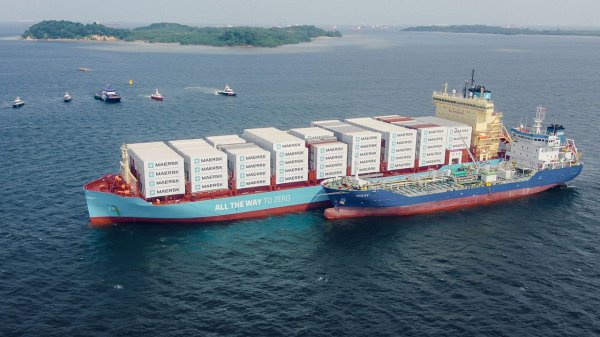Russia records rise in fuel oil output
Fuel oil production up 7.7 percent on higher seasonal demand.
Fuel oil production in Russia increased by 7.7 percent during the month of October, according to recent data released by the Russian Energy Ministry, Reuters reports.
Higher winter demand last month led to fuel oil output rising to an average of 177,310 metric tonnes per day.
Gas oil production was also higher in October, up 0.6 percent on the previous month to 187,087 tonnes per day.
Meanwhile, monthly output figures for jet kerosene and gasoline both dropped last month, falling by 14.2 and 4.1 percent respectively compared to levels recorded for September.
Data released by the Energy Ministry showed a total decrease in oil production of 0.4 percent, as the country's refineries processed 4.73 million barrels per day (bpd) of oil, versus 4.75 million bpd in September.
However, in a comparison with Russian refinery output in 2007, last month's figure was 8.8 percent higher than total production during the same month last year.
The release of Russia's latest monthly production figures comes only days after Russia's energy minister, Sergei Shamtko said that Russian companies could reduce output and exports should they become unprofitable.
Speaking to reporters in Siberia last week, Shamtko commented "Oil companies should decide themselves. If it's unprofitable, then they could decide to lower production."
"Almost all OPEC members, probably with the exception of Saudi Arabia, are seriously unhappy about the current oil price levels. The situation today is that many countries are on the brink of production profitability," he added.
"And we expect - and this is our joint opinion with OPEC - that if it continues that way, then we will not only face a substantial cut in oil supplies to the world's markets in the mid-term, but also a drop in production capacities," said Shamtko.
Last month, Russia's leading oil producer, Rosneft increased production from 348,175 bpd in September to 269,862 bpd. Meanwhile, Lukoil, the country's second largest oil company, recorded a 62,011 bpd drop in output from 892,476 to 830,465 bpd.
Higher winter demand last month led to fuel oil output rising to an average of 177,310 metric tonnes per day.
Gas oil production was also higher in October, up 0.6 percent on the previous month to 187,087 tonnes per day.
Meanwhile, monthly output figures for jet kerosene and gasoline both dropped last month, falling by 14.2 and 4.1 percent respectively compared to levels recorded for September.
Data released by the Energy Ministry showed a total decrease in oil production of 0.4 percent, as the country's refineries processed 4.73 million barrels per day (bpd) of oil, versus 4.75 million bpd in September.
However, in a comparison with Russian refinery output in 2007, last month's figure was 8.8 percent higher than total production during the same month last year.
The release of Russia's latest monthly production figures comes only days after Russia's energy minister, Sergei Shamtko said that Russian companies could reduce output and exports should they become unprofitable.
Speaking to reporters in Siberia last week, Shamtko commented "Oil companies should decide themselves. If it's unprofitable, then they could decide to lower production."
"Almost all OPEC members, probably with the exception of Saudi Arabia, are seriously unhappy about the current oil price levels. The situation today is that many countries are on the brink of production profitability," he added.
"And we expect - and this is our joint opinion with OPEC - that if it continues that way, then we will not only face a substantial cut in oil supplies to the world's markets in the mid-term, but also a drop in production capacities," said Shamtko.
Last month, Russia's leading oil producer, Rosneft increased production from 348,175 bpd in September to 269,862 bpd. Meanwhile, Lukoil, the country's second largest oil company, recorded a 62,011 bpd drop in output from 892,476 to 830,465 bpd.

|
VARO Energy expands renewable portfolio with Preem acquisition
All-cash transaction expected to complete in the latter half of 2025. |
|
|
|
||

|
NYK trials biofuel in milestone coal carrier test
Vessel is used to test biofuel for domestic utility company. |
|
|
|
||

|
H-Line Shipping orders LNG bunkering vessel
Vessel with 18,000-cbm capacity to run on both LNG and MDO. |
|
|
|
||

|
How to engineer and manage green shipping fuels | Stanley George, VPS
Effective management strategies and insights for evolving fuel use. |
|
|
|
||

|
Swedish government bans scrubber wastewater discharges
Discharges from open-loop scrubbers to be prohibited in Swedish waters from July 2025. |
|
|
|
||

|
MAN Energy Solutions achieves 100% load milestone for ammonia engine
Latest tests validate fuel injection system throughout the entire load curve. |
|
|
|
||

|
Petrobras secures ISCC EU RED certification for B24 biofuel blend at Rio Grande
Blend consisting of 24% FAME is said to have been rigorously tested to meet international standards. |
|
|
|
||

|
Stolt-Nielsen to fully control Avenir LNG with acquisition
Share purchase agreement to buy all shares from Golar LNG and Aequitas. |
|
|
|
||

|
Bureau Veritas supports launch of CIMC SOE's LNG bunkering vessel
Handover of Seaspan Energy's cutting-edge 7,600-cbm vessel completed. |
|
|
|
||

|
Methanol as a marine fuel | Steve Bee, VPS
How environmental legislation has driven the development of low-sulphur fuels and methanol-ready ships. |
|
|
|
||
Related Links
- · Russia says Nov export duty cut 'not possible' [Insights]
- · Russia raises fuel oil export tax [Insights]
- · Explosion at fuel oil-producing refinery [Insights]
- · Fire at Gazprom Neft refinery is extinguished [Insights]
- · Russia [Directory]

